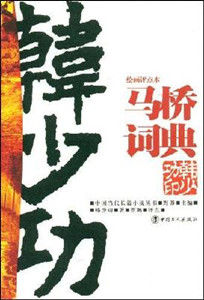外媒推荐不该错过的五本中国书:马桥词典
 《马桥词典》
《马桥词典》(A Dictionary of Maqiao)
《马桥词典》
作者:韩少功
A welcome relief from the overripe camp of much contemporary Chinese literature, ' A Dictionary of Maqiao' is a tightly written, gnomic work that packs epic historical sweep into a series of dense vignettes. Disguised as a 'dictionary' of the dialect of Maqiao, a small village in Hunan, the novel defines 115 local terms such as 'Curse-Grinding,' 'He-Ground (and She-Field),' 'Nailed Backs' and 'Streetsickness,' quickly expanding from a mere compendium of definitions into a patchwork tale of bizarre power. Though the story and its setting are familiar from other Chinese fiction -- an 'educated youth' is sent down to a village during the Cultural Revolution -- the author's narrative choices make that whole world feel new。
在陈朽的当代中国文坛,《马桥词典》是一部受人青睐的先锋之作。整部小说通过讲述古往今来一系列丰富动人的小故事呈现了史诗般的历史,其结构紧凑,语言精辟。《马桥词典》以词典的形式收录了湖南一个小村寨──马桥──的方言。全书共录有115个当地词条:从“磨咒”、“公地(以及母田)”到“背钉”、“晕街”,它以这些词条为引子,从纯词典的形式延伸扩展、过渡为由一个个小故事拼绘成的大图景,饱含意蕴。虽然《马桥词典》的故事内容及背景与其他一些中国小说相似,叙事者是一位在文化大革命期间下放到农村的知青,但作者选用的叙事文体却让世人眼前一亮。
That's the appeal of the book in a nutshell. Plenty of Chinese novels claim to be heir to the magical-realist tradition, but 'A Dictionary of Maqiao' does it right: Presenting the known world as a foreign land, promising to guide the reader through it and teach him its ways, but only deepening the mystery with each patient, detailed definition。
简言之,用词典的语言来写小说的方式使这本书与众不同、引人入胜。虽然很多中国小说都自诩继承了魔幻现实主义的传统,但《马桥词典》诠释的这种风格才称得上纯正到位:将熟知的世界描绘成一幅异乡的摸样,通过对每个词条进行耐心、细化的定义来深化语义的神秘意蕴,以这样的方式引领读者在字里行间探索领悟。
(To Live)
《活着》
作者:余华
Even if you've seen Zhang Yimou's film adaptation of Yu Hua's 'To Live,' that is no excuse to pass up this fantastic 1993 novel. Both the film and the novel are authentically Yu Hua, owing to the writer's intimate involvement in the screenplay, but the novel is significantly darker: In the up-and-down life of the protagonist, a wealthy-scion-turned-peasant named Fugui, the scales lean increasingly toward the downs。
即使你已看过张艺谋导演根据余华同名小说改编拍成的电影《活着》,你也应该再去读一读1993年的原着小说,内容精彩不该错过。不论是电影还是小说原着,你都能读到真正的余华,因为他亲身参与了影片《活着》的创作过程。相较而言,他的原着小说要沉重得多:主人公福贵一生浮沉起伏,出身为地主少爷的他最终沦为贫苦佃户,生活日渐潦倒。
Despite its tragic strains, 'To Live' manages to redeem itself from the 'rural misery' stereotype that plagues many modern Chinese epics. As we follow the shifting fortunes of Fugui and his family through the capricious evolution of 20century Chinese politics, from the Republican to the Communist period, the Great Leap Forward to the Cultural Revolution, what emerges is a meditation on the nature of suffering itself, and the considerable resources the human spirit employs to lessen its sting。
尽管《活着》烙有悲剧故事的特性,但它还是跳出了现代中国文学作品惯用的“乡土苦难”的老套模式,从众多庸作中脱颍而出。这部小说讲述了福贵及其整个家族在20世纪中国政局风云变幻中浮沉起伏的过程:从民国时期到共产党执政,从大跃进到文革时期。故事揭示了有关苦难本身的思考以及人类精神上所依仗的、用来减少人生痛楚的大量财富。
The result is not a simple accumulation of misery, but rather a clear-eyed attempt to come to grips with the fact of misery, fortified by the sublime assertion that this unflinching attempt is in itself worthwhile. In this sense, the satisfaction of reading 'To Live' is comparable to that of reading existential philosophy--just watch out for the cathartic punches. They could knock you flat, as they did to me when I burst into tears while reading this book on a road trip, leaving my travelling companions perplexed. None of them knew the name Yu Hua. All I could do was point to the book in my hands, and say, 'It's China, man.'
这部小说不是苦难本身的简单堆积,而是一次对苦难剖析的尝试。作者试着用清晰的思路解读苦难的事实,他的解读因为这个论断而得到深化:即坚持不懈的尝试本身是值得的。从这个层面上讲,读《活着》带来的满足感可与阅读存在哲学相提并论,但要留意那些情感丰盛的抓人字句,它们可能会让你的感情决堤、彻底击垮你的内心防线,这是我的切身感受。当时,我在一次公路旅行中读了这本书,看到动情处眼泪便像决了堤的洪水,那情景让与我结伴而行的人不知所措。他们之中没有一个人认识余华,所以我只能指着手中的书说,“讲的是中国,伙计。”
Endure
(英译本)
作者:北岛
Clean-voiced lutes and lantern-lit parties on the water have not been the concern of Chinese poets for over a century, and yet they still seem to invade the imagination whenever the term 'Chinese poetry' is introduced in English-speaking contexts. This is unfair and a great shame. Just as classical Chinese poetry, its subject matter and aesthetic precepts, invigorated English-language poetry in the mid-1900s, the poetry of contemporary China has the power to uncover new paths of focus for poets today. Former exile poet Bei Dao is by far the best-known of Chinese poets since 1978, and the quality of his work is recognized by poets both within China and without. He has spoken as the oracle of the conflicted zeitgeist of a modernizing China, while his poetics have stepped past the fashions of his time into new territory。
一百多年来,清远琴音与浆声灯影中的故友相聚并不是中国诗歌关注的焦点。但在英语语境中只要一提到“中国诗歌”这个词,人们似乎还是会联想到这些。这对中国诗歌不公,也令译者蒙羞。就像中国古诗词一样,当代中国诗歌在题材选择与审美观上都促进了20世纪中期英文诗歌的发展,它也为现在的诗人创作开辟了新径。1978年迄今为止,曾背井离乡的诗人北岛在中文诗歌界最为知名,他的作品得到了国内外同仁的一致认可。在中国的现代化进程中曾涌现出互相对抗的时代思潮,北岛在这些思潮中如先知一样写作发声,他的诗歌创作也超越了时代局限、步入到一个新境地。
'Endure,' the newest collection of Bei Dao's poetry in English, is a collaborative effort between the poet-translator Clayton Eshleman and Lucas Klein, translator and assistant professor at City University in Hong Kong. The poems the present have been carefully selected to represent Bei Dao's best and most significant work from the 1970s to the present. The English editions take some inspiration from earlier translations, but far outpace their ancestors for clarity and full re-creation of poetic ideas. The volume even includes an appendix that depicts the process of interpretation through an email exchange between Klein and Eshleman. This isn't just an important book; it's a good one。
Endure是一本收录了北岛作品的最新英译本诗集,由诗歌翻译家克莱顿埃·什尔曼(Clayton Eshleman)与香港城市大学(City University in Hong Kong)助理教授、译者卢卡斯·克莱因(Lucas Klein)合力译成。收录其中的诗歌均是精选之作,代表了1970年代至今这段时期北岛最好、最重要的诗作。《Endure》汲取了之前英译本的一些灵感,但在语句清晰度与诗学思想重建方面远远超过了他们的前辈。这本诗集甚至还在附录中收集了克莱因与埃什尔曼在翻译过程中交换意见、共同探讨的电子邮件。Endure不单单是一本重要的书,更是一本好书。
- 三美国译者签约翻译中国科幻畅销书《三体》2012-11-08 11:07
- 揭秘脱口秀女王奥普拉最爱看的十本书2012-10-08 16:07
- 《钓鱼岛是中国的固有领土》白皮书2012-09-26 16:39
- Serena优雅外婆出演《灵书妙探》2012-08-09 15:03


